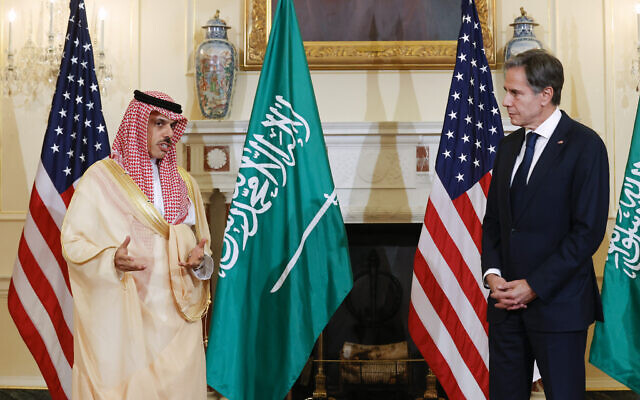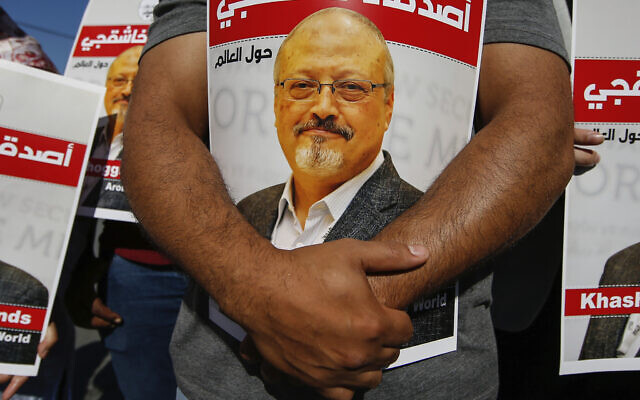The White House on Tuesday announced the dates for US President Joe Biden’s highly anticipated first trip to the Middle East, which will include stops in Israel, the West Bank and Saudi Arabia from July 13 to July 16.
Biden accepted an invitation to visit Israel in late April. The trip was initially planned for late June, but was later delayed to July over what the White House said were scheduling issues. According to an Israeli official, those scheduling issues related to the Saudi leg of the trip, which was a later addition that exposed the president to criticism from some Democrats, who expected him to maintain a firm stance against Riyadh over its human rights record.
The trip will begin in Israel, where the president will meet with Israeli leaders, White House Press Secretary Karine Jean-Pierre said in a statement. An Israeli official told The Times of Israel that Biden will meet with Prime Minister Naftali Bennett, President Isaac Herzog, Foreign Minister Yair Lapid and Defense Minister Benny Gantz. The official added that Biden is also slated to visit the Yad Vashem Holocaust memorial and East Jerusalem.
A senior Biden administration official briefing reporters on Thursday said the president would likely tour a US-funded missile defense system in Israel in order to highlight White House efforts to secure an additional $1 billion in funding for Iron Dome battery replenishments after the May 2021 Gaza war. Biden will also “discuss new innovations between our countries that use laser technologies to defeat missiles and other airborne threats.”
The administration official said the Israel visit will also focus on the Jewish state’s “increasing integration into the region through the Abraham Accords — normalization agreements Jerusalem signed with the UAE, Bahrain and Morocco — through the strengthening of Israel’s ties with Israel and Egypt and through the creation of a new forum established by the Biden administration that includes the US, the UAE, Israel and India — the I2U2.”
While in Israel, Biden will participate in a virtual summit of the I2U2 alongside Bennett, UAE President Mohamed bin Zayed and Indian President Narendra Modi, the US official said, in what would be the highest-level gathering of the forum to date. The leaders will discuss “the food security crisis and other areas of cooperation across hemispheres where the UAE and Israel serve as important innovation hubs.”
US Secretary of State Antony Blinken takes part in a Zoom call with the Foreign Ministers of Israel, India and the UAE on October 18 2021 (State Department)
Biden’s trip will also coincide with the opening of the Maccabiah Games, which brings together Jewish athletes from around the world to Israel for an Olympic-like competition and is being held for the the first time since 2017. The president may have the opportunity to meet with some of the participants, the senior US official said.
“He has a lifelong connection to the country and has charged [all of us with making] sure we’re doing all we can to strengthen Israel security, prosperity and integration into the larger region — both now and over the longer term.,” the US official added.
Biden will then travel to the West Bank, where he will meet with Palestinian Authority President Mahmoud Abbas and other Palestinian leaders. Those meetings will likely take place in Bethlehem, the US official said.
Despite Biden restoring ties with the PA and announcing the restoration of half a billion dollars in aid that had been almost entirely cut by his predecessor, Ramallah has grown increasingly frustrated with the Democratic president’s failure to follow through on his promises to reopen missions for the Palestinians in Jerusalem and Washington.
The administration official said Biden and Abbas would discuss “the ways in which we might rekindle a new political horizon that can ensure equal measures of freedom, security, prosperity and dignity to Israelis and Palestinians alike.”
The PA has been pushing for more talk on diplomatic initiatives as its popularity among Palestinians continues to plummet, while the Hamas terror group has been emboldened in recent months, capitalizing on intense clashes at the Temple Mount.

US Assistant Secretary of State for Near Eastern Affairs Barbara Leaf (L) meets with Palestinian Authority President Mahmoud Abbas at the latter’s office in Ramallah on June 11, 2022. (State Department/Twitter)
Israel has argued that the sides are not ready for high-stakes negotiations over a two-state solution, with the ruling coalition led by Bennett — an opponent of Palestinian statehood — barely holding on and with the PA particularly weakened in Ramallah.
The US has appeared inclined to agree with Israel while arguing that a political horizon should still be maintained and nurtured so that the sides can one day be ready for such talks. It has been particularly critical of unilateral steps by both sides that complicate prospects for a two-state solution.
The administration official told reporters Thursday that the president’s visit to the West Bank will be the “start of what we hope will be new and reinvigorated dialogue — both between the United States and the PA but also between the PA and regional capitals and, most importantly, [the PA and] Israelis.”
Biden will then fly directly from Israel to Jedda — a rarely used route that requires Saudi approval and represents a tiny step toward normalization with the Jewish state. While in Jedda, he will participate in the annual GCC+3 summit with Gulf Cooperation Council leaders from Saudi Arabia, the UAE, Bahrain, Kuwait, Oman, and Qatar in addition to Egypt, Iraq, and Jordan.
Asked if Biden will meet with Saudi Crown Prince Muhammad bin Salman, whom US intelligence fingered as responsible for authorizing the 2018 killing of journalist Jamal Khashoggi, the administration official said, “We can expect the president to see the crown prince.”
The meetings in Saudi Arabia will cover the UN-mediated truce in Yemen, expanding regional economic and security cooperation, deterring threats from Iran, advancing human rights and ensuring global energy and food security, the official said.

US Secretary of State Antony Blinken, right, and Saudi Foreign Minister Prince Faisal Bin Farhan Al Saud speak to reporters at the State Department in Washington, Oct. 14, 2021. (Jonathan Ernst/Pool via AP)
“I think the president will discuss some pretty innovative initiatives we have ongoing in CENTCOM in the Red Sea — some unique naval task forces, which we’ll discuss on the security side,” the official said. Biden officials are reportedly working to form a joint defense infrastructure between Israel and its Arab neighbors against Iran.
The US has also reportedly been brokering talks between Saudi Arabia and Egypt aimed at finalizing an agreement to transfer the Red Sea islands of Tiran and Sanafir from Cairo to Riyadh.
The islands feature prominently in the 1979 Israeli-Egyptian peace agreement and the transfer would require a degree of Israeli support. As a result, the US and Israel are reportedly pushing Riyadh to take a series of small steps toward full normalization with Jerusalem in exchange for Israel’s compliance with the island transfer.
Biden said Sunday that his visit to Saudi Arabia will also address Israel’s national security.

People hold posters of slain Saudi journalist Jamal Khashoggi, near the Saudi Arabia consulate in Istanbul, October 2, 2020, marking the two-year anniversary of his death (AP Photo/Emrah Gurel, File)
Asked whether Biden will raise the Khashoggi murder during his meetings with Saudi officials, the Biden administration official said Monday that the US is not ignoring conduct that took place before the president entered office. However, such discussions will take place behind closed doors.
After vowing during his presidential campaign to treat Saudi Arabia like a “pariah state,” Biden has more recently worked to warm ties with Riyadh against the backdrop of Russia’s invasion of Ukraine. US-led international sanctions against Moscow have led to dramatic spikes in oil costs back home and Washington has been pushing the Saudis to help compensate by producing more oil to replace the sanctioned Russian crude.
The administration official highlighted the recent decision by the Organization of Petroleum Exporting Countries, where Riyadh is a leading member, to raise its planned supply increases this summer by 50 percent.